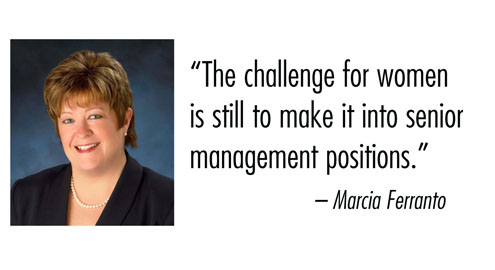
‘Transportation You’ leads young women to the transportation industry
By Glenn Swain

Last November Marcia Ferranto, executive director of the Women’s Transportation Seminar International (WTS), saw more of the Sheraton Waikiki Hotel conference halls than the beautiful scenery outside her door. Ferranto was in Hawaii for the APEC CEO Summit. The Asian Pacific business event drew thousands of economic and business leaders from around the world, including President Obama and Secretary of State Hillary Rodham Clinton. Ferranto met with representatives of APEC economies interested in assembling a networking system in their countries to advance women in transportation. Ferranto brings more than 20 years experience to her position of advocating educational and career development for women. She previously held posts with the Delaware Art Museum as acting director, chief financial officer and director of finance and human resources.
“What’s interesting is that WTS is not currently pursuing a strategic international plan, says Ferranto. “We are being driven by the countries.”
Founded in 1977, Washington, D.C.-based WTS is an international organization dedicated to the professional advancement of women in transportation. Claiming more than 5,000 members — both men and women — WTS is helping women find opportunities and recognition in the transportation industry through its five focuses: access, networking, education, mentoring and professional development.
While Ferranto and her organization have international foresight, she says the bigger challenge lies on domestic soil. In a traditionally male-dominated industry, Ferranto says the biggest hurdle is simply the low numbers of women in the transportation industry itself.
“The challenge for women is still to make it into senior management positions,” she says. “It’s not because companies are saying we’re not hiring women; it’s because the women are not out there to be hired. They’re either leaving the industry before they get to senior level management or there are 100 men to every woman for a senior management job.”
It would be easy for Ferranto to complain of discrimination, but she doesn’t. Instead, she sees WTS as both educating companies to the needs of advancing women and trying to convince women to not only enter the transportation industry but to stay there.
And while not having hard statistics, Ferranto says she hears from other women of pay inequity compared to male counterparts. She stresses that the focus is more on women being under-represented in the industry and not the level of salary.
“WTS is not representing women being discriminated against,” Ferranto says. “We try to give them access to the highest-ranking people in the industry so they can network and build connections. We want to inspire women to further their career in transportation.”
Ferranto says the transportation industry has not become women-friendly, believing that it has not adequately addressed the balance between the needs of women in their work and personal lives. She says women in the field tell her the vast majority of industry activities they attend are really geared toward men and not conducive to a gender-balanced workforce. Bonding golf outings are more popular than, say, going to the theater. Many women simply live with the ugly reality that they need to adapt to the male environment.
Ferranto and the 48 WTS chapters are working on a remedy she believes will bring more women into the industry. In partnership with the Department of Transportation, WTS recently launched a program called “Transportation You,” which targets young women between the ages of 13 and 18. As a mentoring model the program introduces transportation to women who may not recognize it is a viable career choice. WTS chapters are working locally with the Girl Scouts, high school counselors and others to stress what Ferranto calls STEM, an acronym for how science, technology, engineering and math fit into the transportation industry.
“We’re building awareness one state at a time through our scholarship program,” Ferranto says. “We have already given out more than $1 million in scholarships, and the program is growing.”
In 2011 WTS gave out about $158,000 in scholarships throughout the U.S.
“We are hoping to add another $25,000 to that this year,” she says. “Our ultimate goal is to raise that number closer to the $300,000 annual mark.”
Ferranto sees the WTS expanding internationally over the next five years, allowing women from all walks of life to find satisfying careers in transportation.
“We’re already in London, and we’re currently working with a group in the Middle East, India and Brazil,” she says. “I suspect we will be in China and Japan, too.” BR
